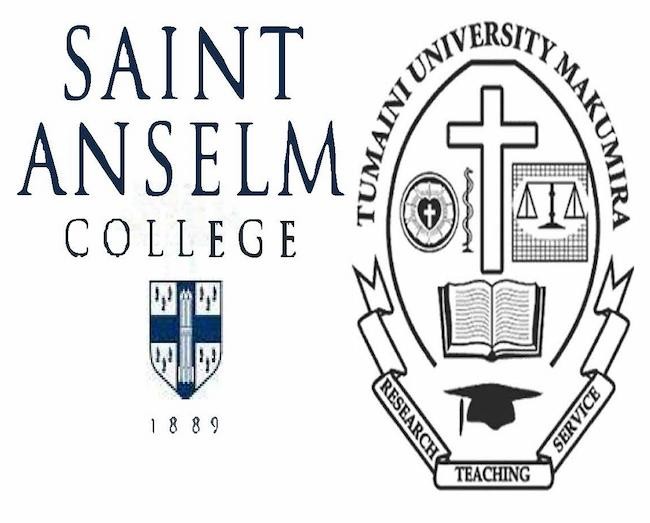Race, Theology, and Pedagogy: Conversations Between Africans and Americans

Ward Holder
St. Anselm College
Date: Wednesday, November 10, 2021
Time: Noon - 1:15pm
Location: Boisi Center, 24 Quincy Road, Conference Room 101
Abstract
In the Spring semester of 2021, Saint Anselm College in Manchester, New Hampshire, and Tumaini University Makumira in Usa River, Tanzania, engaged in a collaborative learning experiment about race, colonialism, and theology. This effort was funded by grants from the Saint Anselm Fund for Catholic Social Teaching, and a Collaborative Grant from the American Academy of Religion. The cooperating professors – R. Ward Holder at Saint Anselm and Cynthia Holder Rich at Tumaini, wished to explore how literally hearing from different voices – a goal frequently stated in liberative pedagogy but not always achieved – could affect the processes of learning about race, about theology, their interconnections, and educational outcomes. Students at the two colleges regularly interacted, both with noted theologians in webinars, and with each other on questions of race and colonialism. The outcomes of this pilot project suggested several fruitful avenues, both in student learning and educational outcomes. Students achieved greater understanding of colonialism and the need for decolonizing, and the manners in which theological constructs are intertwined with cultural conceptions about race; the outcomes demonstrated the importance of group work and discussion, the persistence of racialized conceptions, and the frequent rejection by dominant group students of conceptions of systemic racism. The lecture will discuss those lessons learned, as well as avenues for further pedagogy and research.
Speaker Bio

R. Ward Holder is a historical and political theologian, and professor of theology at Saint Anselm College in Manchester, New Hampshire. He writes on the political theology, biblical interpretation, and the influence of the Reformation on later traditions. His most recent works include Calvin and the Christian Tradition: Scripture, Memory, and the Western Mind, to be published by Cambridge University Press in 2022, and the co-authored Reinhold Niebuhr in Theory and Practice: Christian Realism and Democracy in America in the Twenty-First Century, that was published by Lexington Press in 2019.
Read More
Claassens, L. Juliana, Charlene van der Walt, and Funlola O. Olojede, editors. Teaching for Change: Essays on Pedagogy, Gender and Theology in Africa. Sun Press, 2019.
Fernandez, Eleazar S., editor. Teaching for a Culturally Diverse and Racially Just World. Eugene, OR: Cascade Books, 2014.
Frediani, Shannon. “Utilizing Pedagogy for Disrupting White Supremacy.” Religions 11 (2020): 544.
Jennings, Willie James. “Race and the Educated Imagination: Outlining a Pedagogy of Belonging.” Religious Education 112, no. 1 (2017): 58-65.
Nothwehr, Dawn M. That They May Be One: Catholic Social Teaching on Racism, Tribalism, and Xenophobia. Maryknoll, NY: Orbis Books, 2008.
Scheid, Anna Floerke and Elizabeth T. Vasko. “Teaching Race: Pedagogical Challenges in Predominantly White Undergraduate Theology Classrooms.” Teaching Theology & Religion 17, no. 1 (January 2014): 27-45.
Teel, Karen. “Getting Out of the Left Lane: The Possibility of White Antiracist Pedagogy. Teaching Theology & Religion 17, no. 1 (January 2014): 3-26.
In the News
On November 10th, the Boisi Center hosted a luncheon colloquium featuring R. Ward Holder, discussing “Race, Theology, and Pedagogy: Conversations between Africans and Americans.” Holder is a political and historical theologian currently teaching at St. Anselm College. Last spring he organized and taught a collaborative course on race and theology with students at St. Anselm and students at Tumaini University Makumira, in Usa River, Tanzania. Through the course, he was able to compile significant insights regarding pedagogy and the effects of international dialogue on an important topic: black theology.
Holder began by outlining the several events in 2020 that stirred up a major reckoning about race in America—notably, the deaths of Ahmaud Arbery, Breonna Taylor, and George Floyd, in addition to the mass demonstrations that followed. Inspired by this action, Holder realized that there was a major gap in the course offerings at St. Anselm: none engaged race and theology directly. He decided to create one, in partnership with his sister, Professor Cynthia Holder-Rich, a missionary teacher in Tanzania. Professors Holder and Holder-Rich set out to create a Zoom course that would allow students at two separate universities and from two different continents to connect and learn together.
The course, entitled Race and Theology, was an undergraduate course offering at St. Anselm that fulfilled the required theology credit. At Tumaini, it was an extracurricular reading group open to undergraduate and graduate students, resulting in an older group of students. Together, these groups met regularly to listen to guest speakers, have group discussions on common readings, and place their theological studies in the context of race in the world.
While teaching the course, Holder also collaborated with education specialist Aubrey Scheopner Torres to conduct a qualitative research project on the students’ learning process in this unfamiliar context.
There were some challenges with the course, as is to be expected for the first round of such an undertaking. The time zone difference made it difficult to schedule meetings between the classes, and the Tanzanian academic calendar does not line up with the American one. Perhaps most importantly, access to electricity, the internet, and computers was significantly limited for the Tanzanian students, though Holder remarked that this obstacle actually helped American students to contextualize daily life for their conversation partners. Holder also acknowledged the structural issues of the research project, in that all of the researchers were European American.
The benefits of the project, however, outweighed the challenges. The St. Anselm students made significant connections between race and theology that they had never before been asked to consider. The Tumaini students were excited about the opportunity to be invited into a dialogue about their experiences of race, and noted that they appreciated the ability to speak freely about sensitive topics. Both groups responded well to speaking with each other and with the guest lecturers, and they consistently requested more opportunities for dialogue.
The major conclusion drawn from the project was that the students overwhelmingly appreciated and benefited from the time to speak with each other and consider their course topics in collaboration. Providing a space for dialogue was crucial. Prior to beginning the course, Holder had not expected the degree of importance this would take, imagining perhaps that the guest lecturers or assigned readings might hold more weight.
Holder ended his presentation by considering the future implications of the course. He acknowledged the difficulty of making connections with teachers and administrators at foreign universities, now that his sister, Holder-Rich, is no longer working in Tanzania. Further, he posited new possibilities for the course structure such as partnering with American HBCUs or re-imagining the content for a Latinx community.
Questions from the audience included how to decenter whiteness and authority when the professor is white teaching about Black theology, whether Zoom provided opportunities for more or less honesty and vulnerability in participants, whether the conversations around race and colonialism would have been different if St. Anselm was not comprised of predominantly white students, and whether there would be any future impact on the curriculum at St. Anselm based on the results of the course.

